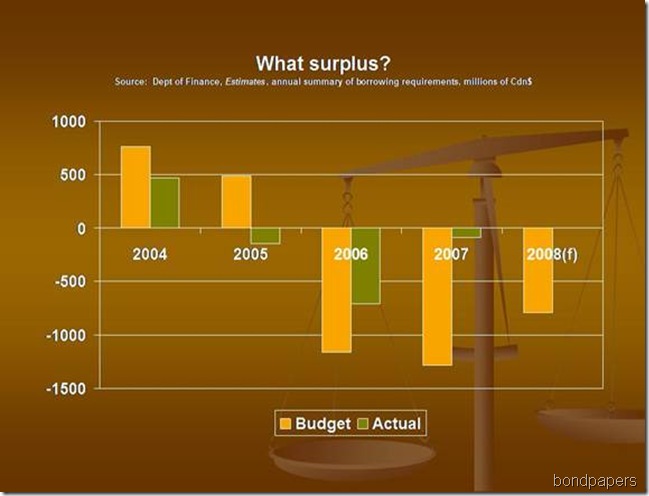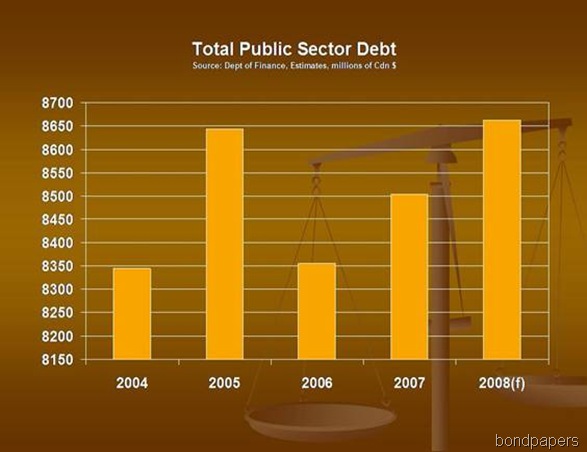Danny Williams, from a call to voice of the cabinet minister's Sunday night call-in show:
And, you know, there are issues that are very, very important to Newfoundlanders and Labradorians and we look at the economy and we look at where the American economy is going and Minister Flaherty was on last week and the Prime Minister is out saying oh no, we don't have to worry in Canada, everything is fabulous, everything is wonderful. But, you know, we have to realize that, you know, we do have a direct link to that American economy and if that tanks at some point in time, then, you know, we are vulnerable.
Followed immediately by:
Now that's not to say that, you know, there's going to be gloom and doom in Canada because Canada's fundamental are sound and I firmly believe that.
Well, there's a relief.
You know.
But it gets better.
You know.
Apparently, the province is somehow shielded from the goings-on in the world economy, even if, you know, we do have that direct link he mentioned and if that link "tanks" we would, you know, be vulnerable:
And on the other side of it, you know, from our own perspective, you know, our economy is strong, we're in a better position than we've ever been, we're also in a very good position now with the, you know, the international financial crisis that's underway. We now, for the first time in our lives, are in a bit of a financial bubble and that's a wonderful thing. We have that protection and the people of this province got the support of the provincial government.
The bubble seems to be some kind of magical Star Trek kinda thing:
But I do think that Newfoundland and Labrador is in a very, very good position. Hopefully our surpluses will continue, hopefully they'll get even larger, it will enable us to do the things that we've been doing. I mean this, for us this hasn't happened overnight. We've been preparing for this.
Ahhh.
 We got surpluses and ones that Williams hopes will get bigger.
We got surpluses and ones that Williams hopes will get bigger.
You know.
Unless that link thing "tanks".
That would be the completely imaginary surpluses, though.
You know.
Which would make the protective bubble surrounding the provincial economy more like The Bubble in St. John's harbour.
Well, not exactly, because apparently some things have been going on behind the doors of Confederation Building people would not be aware of.
Like, you know, building a war chest whatever that means:
You know, we've built a war chest and, as well, we've tried to move our debt down to get us in a good position so that if ever there was a very, very, very serious situation we'd have to take that debt back up again, but we'd have the ability to do it. But, you know, we've been really, very fiscally prudent and fiscally responsible.
Ahhh, again.
You know.
So there's great comfort for all of us because even though we are vulnerable, there is a bubble of some kind, consisting of imaginary surpluses and then there's the debt which has been moving down due to the really very fiscally prudent responsibleness so that - only if there was a very, very, very serious situation - we could drive the debt up again.
No word on what would happen if things only got very, very serious.
Or if that link thing tanking would be merely very serious, or if it would get enough veries to qualify for the debt growth bubble protection thing and then something else besides.
But anyway, we are vulnerable and then again, we aren't.
You know.
 The debt has been going down.
The debt has been going down.
Just like the chart at right shows.
If you hold it upside down, that is.
And it's not like we'd be planning on borrowing any more money in the meantime.
Like say for a major oil project.
Or a major hydroelectric project which the Premier said at the start of his call he had been busy working on.
A nine billion dollar project, which, if you notice, is actually more than the entire public debt load is currently.
Loyal Bond Papers readers will recall the idea of doubling the public debt being raised in January 2006. That would be, if you recall, long before there was any talk of a major economic downturn. When the downturn came a little closer to reality, the Premier was willing to acknowledge it would affect the Lower Churchill.
But then the Premier finished on a high note:
So, you know, Newfoundland and Labrador is very much on the move and so, you know, I'm pleased with the position we're in and I do think we're in a favoured position, to be quite honest with you.
To be quite honest, it is completely confusing to know that the province is vulnerable - as the Premier started out saying - and then to have him conclude by saying that this is a favoured position.
Up is down. Vulnerable is favourable. Deficits are surpluses.
It would be funny, if it wasn't all so very serious.
You know.
-srbp-
 We got surpluses and ones that Williams hopes will get bigger.
We got surpluses and ones that Williams hopes will get bigger. The debt has been going down.
The debt has been going down.